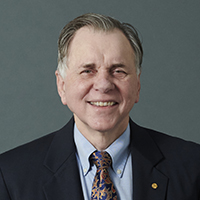Barry James Marshall

Barry Marshall
2005 Nobel Prize in Physiology or Medicine
Barry James Marshall is Clinical Professor of Medicine and Microbiology at the University of Western Australia and Director of its Marshall Centre for Infectious Diseases Research and Training. But he is best known for two other things: infamously, for drinking bacteria, and famously, for winning a Nobel Prize with Professor Robin Warren. To Prof Marshall’s regard, the latter was a consequence of the former.
It was during a hospital rotation in 1981 when Prof Marshall met Prof Warren at the Royal Perth Hospital (RPH). Prof Warren was working on stomach ulcer patients who showed curved bacteria in their stomach biopsies but had no diagnosis. This piqued Prof Marshall’s interest because bacteria do not usually survive in the acid-filled stomach. When they found that all ulcer patients had a particular bacterium, Prof Marshall’s interest only increased. And so began their work on Helicobacter pylori, an endeavour that would win them the Nobel Prize 20 years later.
Prof Marshall also collaborated with other researchers, highlighting his years at the Fremantle Hospital as happy and productive. Here, he confirmed his findings obtained at the RPH that most peptic ulcer patients have H. pylori. As more scientists worldwide obtained results that supported his, it became a remarkable, encouraging and highly collaborative time for Prof Marshall.
But with this recognition came criticism and disbelief. To prove his work, Prof Marshall needed an animal model, but after many unsuccessful attempts to infect one, he decided to use himself. He drank a bacterial suspension, became sick and took a gastroscopy to clarify his diagnosis. With this, he demonstrated that H. pylori causes acute gastritis that can lead to the development of ulcers. Notably, his 2005 Nobel Prize with Prof Warren was “for their discovery of the bacterium H. pylori and its role in gastritis and peptic ulcer disease.”
Prof Marshall’s work is built on collaboration. Importantly, he explains that collaboration is about creating value for both sides. “No science is too difficult to understand—you just need to find the person who knows it and can explain it to you. In turn, you also have to think of what value you can create for them.” To young scientists, he also says to do what they like and what they think is interesting and to not worry too much about it.
At present, Prof Marshall is developing new diagnostics and treatments to target H. pylori. He also heads the Noisy Guts Project, which aims to develop an acoustic belt that can record gut sounds that can be used for non-invasive diagnostics and the monitoring of gut problems.
His other awards include the 1994 Warren Alpert Prize, 1995 Albert Lasker Award, 2002 Keio Medical Science Prize and 2003 Australian Centenary Medal. He is also the Ambassador for Life Sciences for Western Australia.

